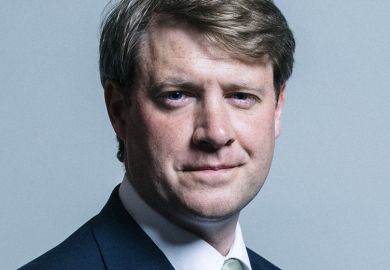Talks on whether the UK will join the European Union’s next research programme post-Brexit may be delayed until November, and work on “strong domestic alternatives” to EU funding is needed, according to the nation’s universities minister.
Chris Skidmore made the comments in evidence to MPs on the Science and Technology Committee after he was asked whether there was a “risk of a hiatus” in the UK’s participation in EU research programmes.
Mr Skidmore also reported that he had commissioned the government’s chief scientific adviser to evaluate alternatives to the mooted £30,000 salary threshold for skilled immigrants to enter the UK post-Brexit. The £30,000 threshold – Theresa May’s preferred option – “can be seen as quite detrimental to the science community”, and alternatives could include a “carve-out for science”, he added.
There is no certainty as to whether the UK will seek to, or be allowed to, associate to the EU’s Horizon Europe research programme, which starts in January 2021.
Mr Skidmore told the committee that he was “keen to make sure we have an ambition to associate to Horizon Europe”, although this would include consideration of “value for money circumstances”.
However, he continued, negotiations are “going to take time” and there are “barriers” – highlighting the fact that European elections and the appointment of a new European Commission will take place later this year.
“We’re getting down into November before we can get back into the details of association for Horizon Europe,” he added.
Some have suggested that this schedule means that the UK will not be able to reach an association agreement in time for Horizon Europe’s start.
Asked by committee chair Norman Lamb if there was a “risk of a hiatus”, Mr Skidmore replied: “I think that’s why it’s also important we are looking at strong domestic alternatives for funding. And that’s as part of a case [going] into the spending review as well – looking at potential international research funds.”
The minister also stressed that full-scale talks “won’t be possible” until the EU has agreed regulations – including on association – for Horizon Europe.
And, until it is clear whether the UK has reached a withdrawal agreement with the EU, or will leave with no deal, the UK does “not have the ability to negotiate with the commission at all”.
Mr Skidmore said the government had been in talks with the scientific societies to “scope out” potential alternatives to the EU’s European Research Council and its Marie Skłodowska-Curie action grants for individual researchers – with participants in these talks “optimistic”.
A key issue would be how to secure “prestige” for a domestic equivalent, he said, also highlighting the fact that the ERC is “run by and for science, not run by politicians”.
The minister also said that “letters have gone into the Treasury” asking it to extend the existing government underwrite on funding under the EU’s existing programme, Horizon 2020 – an underwrite that would apply in the event of a no-deal Brexit – to all elements of the scheme. The UK government underwrite does not currently apply to grants under the ERC and MSCA parts of the programme.
Register to continue
Why register?
- Registration is free and only takes a moment
- Once registered, you can read 3 articles a month
- Sign up for our newsletter
Subscribe
Or subscribe for unlimited access to:
- Unlimited access to news, views, insights & reviews
- Digital editions
- Digital access to THE’s university and college rankings analysis
Already registered or a current subscriber?








